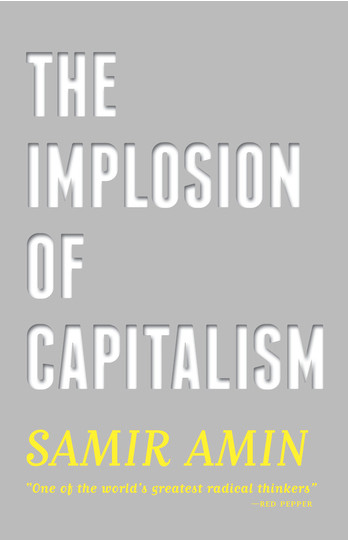The Implosion of Capitalism is political economist Samir Amin’s take on the connections between key events of our times – financial crisis, Eurozone implosion, the emerging BRIC nations and the rise of political Islam – identifying them as symptoms of a profound systemic crisis. Despite some theoretical flaws, this is a stimulating book offering a wide-ranging and timely analysis and critique of the current form of capitalism, as well as posing challenges for the radical Left about steps towards a socialist future, writes Christel Lane.
 The Implosion of Capitalism. Samir Amin. Pluto Press. November 2013.
The Implosion of Capitalism. Samir Amin. Pluto Press. November 2013.
In contrast to most analyses of the current crisis of capitalism, Samir Amin’s The Implosion of Capitalism does not indict the rule of free markets, but instead points the finger of blame at the global dominance of large global corporations, termed ‘generalized monopolies’.
Building on many decades of work in this field, Amin’s new book offers a general analysis of the capitalist system which aims to explain its current ‘implosion’, as well as put forward many ideas of alternative paths towards creating a socialist society. Amin seeks to update the work of Marx and Lenin, but his theory is particularly informed by the work of Mao Zedong. The book will appeal to Marxist political economists, particularly those on the radical left of the spectrum. However, written in a lucid and accessible style, it offers many insights also to more general critical readers interested in political economy with a global scope, even if they do not necessarily accept the whole radical left analysis and vision for change Amin sets out. Amin’s book adopts a global scope, but remains beholden to the nation and nation state. Amin is anti-globalization which he views ‘as nothing other than a new stage of imperialism’.
The theory’s comprehensive nature – encompassing not only the whole globe, but also offering historical analyses and future possible scenarios – makes for a very rich analysis which cannot be fully appreciated in this short outline and review. Particularly his many suggestions of strategies to transform capitalism and advance to socialism cannot be covered.
Amin’s concept of generalized monopolies posits that large oligopolistic corporations have become sufficiently powerful to control the whole productive system not only of western developed countries but also of the global South. Small and medium-sized enterprises (SMEs ) in developed countries are said to be totally dependent on these monopolies, and firms in the global South function as mere subcontractors to them. Generalised monopolies, according to the author, are no longer effectively regulated by national states which have lost the political autonomy they once possessed. Hence, electoral democracy, for Amin, has become a charade, providing no longer any possibility for mediation between the new generalized proletariat of wage earners and the generalized monopolies. In the global South, the states of nominally independent countries have lost all autonomy and hence the means to move out of their subordinate economic and political status. A particularly important position among these monopolies is taken by banks, enabling Amin to analyse the current financial crisis. In common with many other authors, he adopts the concept of companies’ financialization. Here he refers to companies’ growing surplus, due to the growing imbalance between the income of dominant and the dominated class, that had to be shifted away from production towards seeking profits in the financial sphere. It is this system of ‘generalized monopoly capitalism’ that is ‘imploding before our eyes’.
The class system in developed countries is no longer solely nationally-based but consists of a relatively small dominant global class – the global oligopoly, comprising mainly the directors and controllers of the generalized monopolies oppressing a generalized proletariat. The latter includes all wage earners, except the controllers of the large corporations. Even relatively well-paid middle class professionals are no more than ‘waged servants’ or ‘agents of capital’, as are the ‘media clergy’. In his eagerness to demonstrate the unsustainability of the current form of capitalism and its dominant class, Amin makes unwarranted, almost nostalgic comparisons with a ‘time we have lost’ – a previous capitalism and even civilization in which workers were exploited by a more benign local bourgeoisie and politicians were less corrupted and cynical.

In the global South, class structures and national dominant classes differ according to their insertion into the world economic system and relation to generalized monopoly capital. Current elites in most of these societies, totally beholden to the western plutocracy, are referred to as ‘corruptionists’.Taking a strong lead from the theory of Mao Zedong, the large peasant classes in many the countries of the South receive detailed consideration, concerning both their present immiseration and their role in the transformation of capitalism.
Property ownership thus has assumed secondary importance in Amin’s class analysis. Although his consideration of control is persuasive, it does not, in my view, warrant the virtual abandonment of the notion of capital ownership. Moreover, if such ownership is no longer important it becomes difficult to understand why Amin wants to see the generalized monopolies nationalized.
In view of the extremely negative role played by banks in the recent crisis, the soaring inequality between the controllers of large corporations and the way governments prove unable or unwilling to tackle the dominance of politics and society by large corporations, Amin’s analysis of current capitalism is often spot-on. But a focus predominantly on their role does not justify dropping the notion that marketization is heavily implicated in recent excesses in and malfunctioning of capitalist development. It is, after all, deregulation of national markets and the unwillingness of international organizations to take on the role of regulating global companies which have facilitated the activities of large banks and corporations.
Furthermore, Amin’s argument would have been strengthened if he had provided some empirical support for his claim that large generalized monopolies are the real ‘villains’ of capitalism. It is, for instance, not at all clear that centralization of capital has increased in the last few decades, nor does the posited relation of ubiquitous domination of SMEs by generalized monopolies ring entirely true. There is big variation between industries and countries in this respect, and Amin often comes across as Anglo (American)-centric. In Germany, for example, a large proportion of SMEs – which are vital to Germany’s economic growth – often are independent, technology- and export-intensive enterprises. They are either independent from large corporations or are interdependent with them, rather than being invariably dominated. Also German SMEs have long abandoned the large commercial banks. Instead, they rely on the localized savings or cooperative banks.
Nor is the relationship between western ‘generalized monopolies’ and companies in developing economies always as ‘ super-exploitative’ as Amin makes out. First, patterns of FDI show that his ‘generalized monopolies’ mainly favour investment in developed economies and thus do not invariably seek to dominate developing countries through foreign investment. Second, although the often totally dominant relationships by western companies in global value chains is a well substantiated fact, in low-value industries, like clothing and toy-making, it is not appropriate to generalize this picture to all outsourcing relationships. In the auto and some parts of the electronics industries, for example, suppliers themselves have become large corporation and relationships are interdependent. Nor is it right to overlook the way in which outsourcing even in clothing has allowed some countries – including China – to upgrade their industries. Some firms/countries have even assumed a dominant role as middlemen operators who organise triangular production networks, as happened, for example, in the case of Hong Kong’s companies. In sum, Amin’s analysis would have been more persuasive if his very large and general claims had been empirically substantiated.
Amin uses the old Marxist concepts of core and periphery and holds imperialism to be an inherent feature of ‘really existing capitalism’. He does not, however, view the global South as an undifferentiated category. Instead, paying attention to recent economic changes, he devotes a whole and very interesting chapter to emerging economies. His definition of this type of economy, however, is very restrictive. He moves beyond the mere statistics of economic growth and stipulates that, to qualify for the label ‘emerging’, a country has to have both a productive strategy which encompasses the whole economy and has to adopt an alternative developmental path to that of the politico-economic global core. The concept thus presupposes an industrial strategy, devised and realised by an autonomous and directive state. This definition excludes most of the BRICs and leaves mainly China, but also – unexplained and ignoring their recent moves towards market principles – South Korea and Taiwan. Brazil is deemed to be only a hybrid case, and most co-called emerging economies, for Amin, show ‘lumpen-development of a massive nature’. Nevertheless, Amin is right in showing scepticism about the recent advancement of the BRICS whose economic development may be a lot more fragile than general admiration of their recent rapid development justifies.
China is Amin’s main model of a political economy that has evolved and integrated an alternative economic strategy. China is no longer capitalist (not even state-capitalist), though he does not yet regard China as socialist. Nevertheless, the Chinese model is viewed as possessing many features held to be exemplary for other political economies of the global South. Amin ascribes China’s model of economic and political economy to following the theory of Mao Zedong. He posits an uninterrupted developmental path from Mao’s time to the present. This not only overlooks the Cultural Revolution but also gives little credit to the contribution of recent leaders, like Deng Xiaoping, to China’s rapid socio-economic transformation since the 1980s. Amin rightly focuses on the merits of a socio-economic strategy which has tackled the important issue of how to deal with a large peasantry in the process of transformation – a problem faced by many countries of the global South. However, in his keenness to emulate the Chinese development strategy, Amin overlooks many features of Chinese society which lack ‘model’ character. He plays down the stark social and regional inequalities and greatly exaggerates the extent to which the peasantry has participated in the growth of economic wealth. A survey of China’s largest companies shows that Amin also is too sanguine about China’s achievements in the field of high-tech industry. One even wonders whether, in view of the massive inward investment into China, its productive system may be described as ‘truly sovereign’.
In conclusion, despite some theoretical flaws, empirical lacunae/misrepresentations and rather unscholarly references to opposed views as ‘imbecile’, this is a stimulating book offering a wide-ranging and timely analysis and critique of the current form of capitalism, as well as posing challenges for the radical Left about steps towards a socialist future.
————————————-
Christel Lane is Emeritus Professor of Economic Sociology at the University of Cambridge. Read more reviews by Christel.








2 Comments